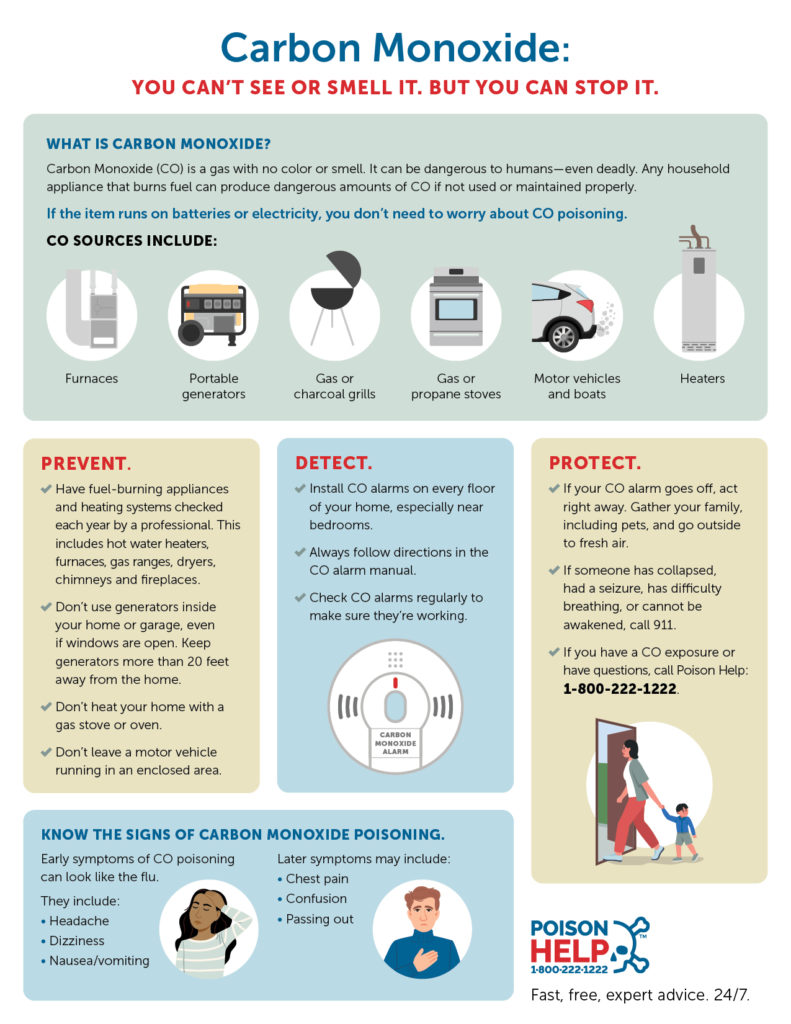What is Carbon Monoxide
Carbon monoxide (CO) is a colorless, odorless, tasteless gas that can kill a person in minutes! Annually, more than 20,000 Americans visit the ER due to CO poisoning; more than 4,000 are hospitalized; and more than 400 Americans die from unintentional CO poisoning not related to fires.
Most Common Sources
Carbon monoxide is created when fuels, such as below, are burned. The appliances that use these types of fuels produce harmless amounts of carbon monoxide if the appliances are maintained and used properly in a well-ventilated area. However, faulty appliances may produce dangerous amounts of carbon monoxide that could be fatal. The gas can also build up in areas that are poorly ventilated.
- Oil, wood or gas furnaces
- Space heaters (kerosene heaters)
- Gas or oil water heaters
- Gas stoves
- Gas dryers
- Fireplaces and wood stoves
- Charcoal grills
- Automobiles/small engines/boats
- Lawn mowers and other gas powered lawn equipment
Symptoms
Early symptoms of CO poisoning can mimic the flu or other illnesses. Carbon monoxide poisoning may lead to unconsciousness and death. CO gas can be especially dangerous for pregnant women and their unborn babies, infants and people with anemia and a history of heart disease.
These symptoms may include:
- Weakness
- Fatigue
- Dizziness
- Headache
- Upset stomach
- Vomiting
- Chest pain
- Difficulty breathing
- Confusion
- Fainting
If you suspect carbon monoxide poisoning, immediately remove yourself and others from the area to fresh air outside and call 911. Be sure to have carbon monoxide levels assessed prior to returning inside.
Tips to Prevent Carbon Monoxide Poisoning
- Install at least one carbon monoxide detector near the sleeping areas in your home.
- Have fuel-burning appliances, venting and chimney systems in your home inspected by a professional technician at the beginning of each heating season.
- Choose appliances that vent to the outside and make sure they are properly installed and well maintained.
- Never use charcoal grills or portable gas stoves inside your home or inside a tent; only use in a well-ventilated area.
- Do not use an oven or gas range to heat your home.
- Do not let the fireplace or space heater run while you are sleeping.
- Do not use any gasoline-powered engines, such as mowers, weed trimmers, chain saws, small engines or generators in enclosed spaces.
- Keep generators outside and at least 20 feet away from any windows, doors or vents.
- Never leave an automobile engine running in a garage, even if the garage door to the outside is open. Fumes can build up quickly.
- Do not sleep in a parked car while the engine is on.
- Have exhaust system in your automobiles inspected for possible leaks.
- Call the Georgia Poison Center for more information.









